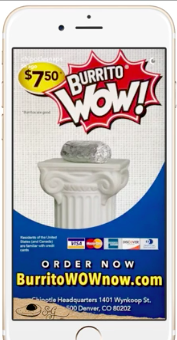Last chance to save on Digiday Publishing Summit passes is February 9


Struggling to regain its footing after a series of food contamination crises in recent months, Chipotle Mexican Grill has been playing offense on social to try to win scared consumers back. The restaurant chain has settled on Snapchat as a way to get millennials back in their seats.
Chipotle is rolling out a weekly show on Snapchat called “School of Guac” to target 13-24-year-old college students. The show, which is basically a slickly produced Snapchat post, is shown at 3 p.m. on Tuesdays. The idea is to build appointment viewing for the Snapchat Generation.
“Most of our audience is Gen Z and Gen Y who spend lots of time on Snapchat, so it makes sense for us to be where they are,” said Jackson Jeyanayagam, head of digital marketing for Chipotle. “We tend to be a little edgier than other brands. Snapchat gives us the canvas to be creative and design-driven.”
“School of Guac” is hosted by young performer Lorena Russi with a The Daily Show-like setup. Each minute-long episode is after-school special meets variety show meets satirical news program. Vice-owned agency Carrot Creative worked with Chipotle to create it.
The first episode discusses the 13th zodiac sign Ophiuchus, which looks like a taco drowning in salsa. In it, Russi gives away free drinks to students. The second episode teaches viewers how to turn burrito foil into a piggy bank, and asks why tortillas are round but tortilla chips are triangular.
“We’ve really tried to stay true to the variety show theme in an effort to hit on something for everyone, rather than everything for everyone,” said Jasmine Jabbour, account director for Carrot Creative. “‘School of Guac’ is about pop culture, burrito culture, and snap culture.”

Of course, Chipotle is not the first brand that has created TV programs for Snapchat. Skivvies brand MeUndies and online retailer Kit and Ace have already posted snaps at reliable, recurring times. But the restaurant chain might be the first to truly replicate the TV environment on Snapchat: It has even woven fake commercial breaks into “School of Guac.”
“It’s not just ask someone to stand on the street with their phone and say ‘Snapchat is the new TV.’ Chipotle wants to do more polished content,” said Jabbour. “Taco Bell is doing very well on Snapchat but it mainly takes an approach of walking around with a phone.”
Carrot is working with tech company Delmondo to measure Snapchat. Metrics from the first two episodes show that “School of Guac” sees an average drop-off rate of 4.7 percent, compared to Delmondo’s benchmark of 25 percent, according to Jabbour.
“We mainly look at engagement, time spent on snaps, views and if people share on our ‘School of Guac’ on Twitter,” said Jeyanayagam.
For the first six months of this year, Chipotle’s revenue plunged to $1.3 billion, down 20 percent from the same period a year prior. The chain reportedly financially settled with over 100 consumers who were sickened after eating at Chipotle.
The chain’s fun, snappy social campaign is a clear ploy to win back scared consumers. On Snapchat specifically, the chain has experimented with ads on Discover, geofilters and most recently, sponsored lens that turned users’ heads into an avocado (with the tagline “ingredients reign,” a truth the chain learned the hard way earlier this year).
Chipotle plans to roll out 10 episodes of “School of Guac” first and then decides if the brand is going to create more programs with reliable times on Snapchat, or if it should do the same on Instagram Stories.
Chipotle is launching a weekly TV show on Snapchat and nobody has reported anything on it yet. Frustrating. #chipotlesnaps #schoolofguac pic.twitter.com/UUPyr82kAP
— Britton Hennessy (@brithennessy) October 12, 2016
More in Marketing

GLP-1 draws pharma advertisers to double down on the Super Bowl
Could this be the last year Novo Nordisk, Boehringer Ingelheim, Hims & Hers, Novartis, Ro, and Lilly all run spots during the Big Game?

How food and beverage giants like Ritz and Diageo are showing up for the Super Bowl this year
Food and beverage executives say a Super Bowl campaign sets the tone for the year.

Programmatic is drawing more brands to this year’s Winter Olympics
Widening programmatic access to streaming coverage of the Milan-Cortina Games is enabling smaller advertisers to get their feet in the door.





